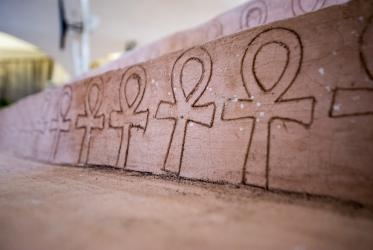Dear sisters and brothers in Christ,
Dear friends,
It gives me great pleasure to address you today and extend greetings from the World Council of Churches. This gathering is a significant opportunity to reflect on the enduring legacy of the Council of Nicaea, visibly demonstrating our shared commitment to living the apostolic faith together in today's world.
Professing Jesus Christ as the Son of God and our Saviour, a central tenet established by the Council of Nicaea, transcends historical doctrine to guide our living faith today. In a world marked by different ideological conflicts, we, as people of faith, should not be ashamed of proclaiming the Good News of Jesus Christ. However, this proclamation needs to demonstrate sensitivity and respect towards people of other faiths. It is our responsibility to present the message of Christ in a way that is both bold and compassionate, recognizing the value of interfaith dialogue and mutual understanding.
Recalling the significance of the Council of Nicaea renews our call for full visible unity, the cornerstone of the ecumenical movement. This journey, which we believe to be a vital part of the Pilgrimage of Justice, Reconciliation, and Unity on which we have embarked, reminds us that our goal is not just increasing theological agreement but a unity that is visible and tangible, reflecting the oneness of the body of Christ. This quest for unity becomes even more pertinent as we look beyond the year 2025, setting our sights on the significant year of 2033 – a year that marks the two-millennial celebration of Christ’s resurrection. Being a part of this journey is essential, as it is a journey that calls for our active participation and commitment to the unity and witness of the Church.
As we look back to Nicaea, we cannot but think about the breakthrough in Christian history brought about by the introduction of the Nicene Creed. To this day, it represents a unifying thread that has the potential to link us across confessional and cultural divides. The Creed reminds us of our shared heritage and the core beliefs that define our faith, providing a solid ground upon which we can build our efforts towards unity and mutual understanding. Although church traditions differ in terms of the regular use and confession of the creed, it nevertheless has a capacity to provide foundation for the unity in faith we continually seek.
The quest for a common day to celebrate Easter is a symbol of our desire for unity. This quest historically played a vital part in the convocation of the Council of Nicaea. As we approach the year 2033, this endeavour takes on an even greater significance. Aligning our Easter celebrations would not only be a remarkable expression of unity but also a powerful witness to the world of our shared faith in the resurrection of Christ. The journey towards this common celebration is a journey towards a shared understanding and experience of the central event of our faith, strengthening our bonds as we move forward together.
I am pleased to announce that the World Council of Churches (WCC) plans to commemorate the Nicaea anniversary with a series of activities derived from various programmes. These activities are designed to reflect on how we live the apostolic faith together today, culminating in the Sixth World Conference on Faith and Order. This historic conference is scheduled to take place from 24 to 28 October 2025 at the Logos Papal Center of the Coptic Orthodox Church in Egypt. The conference will explore the theme “Where Now for Visible Unity?” from the interconnected vantage points of faith, unity, and mission. Many world communions and churches plan to commemorate the anniversary of the Council of Nicaea. We are delighted to join hands with these initiatives, bringing churches closer together and assisting them in witnessing God’s transforming mercy to today’s world.
Reflecting on the legacy and current relevance of the Council of Nicaea, let us embrace our identity as people of faith, proclaiming Christ’s Good News in today’s world. As we face divisions, injustices, hopelessness, let us commit to proclaiming the hope for a better world, transformed by divine mercy. Let us commit to working towards the visible unity of the Church, journeying together on the Pilgrimage of Justice, Reconciliation, and Unity. And let us hold fast to our common faith, seeking every opportunity to celebrate our unity in Christ, especially as we hope for and look forward to a common celebration of Easter. Thank you for your dedication to these vital aspects of our faith and for your participation in this sacred journey.
Yours in Christ,
Rev. Prof. Dr Jerry Pillay
general secretary
World Council of Churches




